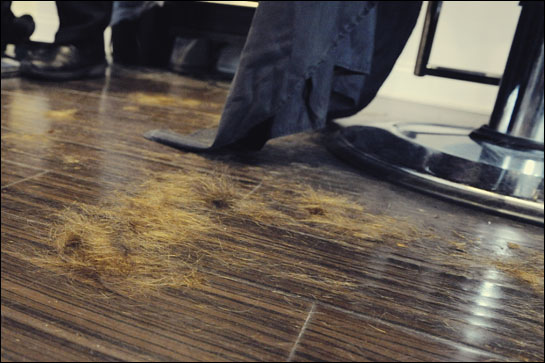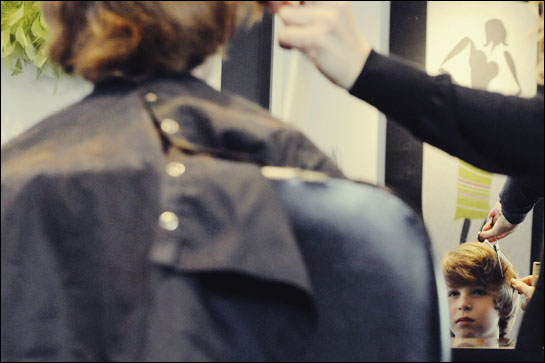Don’t let your resume be a roadblock to your career

I am writing this post at the hairdresser. It’s my son’s second haircut this month. He loves the process of reinvention. While the haircuts feel extravagant, I like that he knows what he wants.
Maybe I overvalue this trait in a person because the most frequent issue I deal with on coaching calls is helping people figure out what they want. It’s a very difficult thing to do, at any stage of life. But then, when they’ve figured out what they want, they almost never have a resume that is ready to get them what they want.
Rewriting your resume is what you do at the very end of the process of figuring out the best job for yourself. Once you know the answer to that question, it should be no problem to rewrite your resume to get that job.
For those of you who don’t want to pay me to rewrite your resume, I’m giving you tips here so you can do it yourself.
1. It doesn’t matter if you are good at your job if you don’t know how to translate that to a resume.
I can say I was a clerk at a grocery store.
Or I can say I took responsibility for end-caps and increase targeted product sales by 15%.
In both cases the bullet describes a low-level job at a grocery store. The first bullet is written by someone who thought their job was stupid. The second bullet is written by someone who is a self-starter, who understands the big-picture of how grocery store goals are met, and who knows how to talk like they are in the business of groceries instead of a slave to groceries.
Both bullets are true, but one is more likely to get someone a job in management. Thinking and writing about the goals of the job you want is a really important skill to learn. Most coaching calls I do are with people who can talk like the second bullet but have written resumes that sound like the first bullet.
2. You don’t need to have had good jobs in order to have a good resume.
When I was younger I was in charge of online marketing for a software company. I could tell you that I managed the web site. But that won’t make you think I’m a rock star. I could also say I managed three online product launches. But that’s so broad that it tells you nothing.
This is a bullet that will get me my next job: Managed an online product launch with ad agencies in seven countries and delivered marketing materials under budget and ahead of schedule.
Here’s the simple truth: The product was really small. The ad agencies were one-person shops and they didn’t speak English so I could barely manage them. And the reason everything went so fast and cheap is because we realized the company was going to be sold so we decided we could skimp on the launch.
See how you can write a good bullet and a bad bullet and both can be true? What’s more, you can write a good bullet about a failed project and you can write a bad bullet about a great project. But what you can’t do is just wing it.
Winging it will leave you underselling yourself. And you end up writing yourself into a corner where it’s impossible to tell a coherent story about why you have made the choices you’ve made in your career and where you are headed.
3. The best career changes are when your resume doesn’t show you’re making a career change.
People don’t want to hire you to do something you’ve never done before. That’s too much trouble. Employers are looking for someone who can hit the ground running, knock the ball out of the park, and all the other idioms that describe the process of trying to hire someone who is really excited about doing the job even though they’ve already been doing it for the past five years.
The reason changing careers is so common is because it’s not fun to be so great at something that your learning curve flattens. A steep learning curve is fun, but knowing all the bad things about the industry you’re in is not fun.
You can’t change spouses all the time, so change jobs instead. But do it in a way that doesn’t put a huge dent in your finances; rewrite your resume to show you have already been doing that career change.
Difficult, yes, but the trick is really to figure out what career is already open to you, based on the experience you have. Which career change can look like a natural progression rather than jumping ship completely?
To do this you need to read between the lines of your resume to remember what’s missing. What did you leave out that you might put in now? What morsels add up to a whole new story? We all have a second, third, or fourth career story in our history.
4. A resume is what’s left when you throw everything away.
I have memorized the Microsoft Style Guide and you will never see me write “click on”—the real way is just click. “On” is implied. But I didn’t write that. I wrote, “Oversaw content development system and streamlined copyediting to cut costs 50%.”
What does that mean? I memorized the Style Guide so we didn’t have to hire a copyeditor. So I deleted the bullet on my resume that said I wrote a business plan for an online product that became the company’s biggest seller. That’s a huge achievement but it had nothing to do with the career I was after.
Which is pretty much why it’s so hard to write your own resume. It’s difficult to leave off the things that felt so grand and important and significant in our lives as we did them. It’s so hard to admit that a resume is not a record of what we’ve done.
Filmmakers always say the film is made by cutting away the parts you don’t need. And a sculptor finds the magic of the material by cutting away at it, the same way a good hairdresser shapes a haircut, really. And the same is true of a career. No matter where you are in your career, what you remove from your work history determines if you reveal a strong, focused, over-performer, or a mediocre, largely lost, middle manager.
My son watches his results studiously. Always planning his next move.

Sometimes he looks like a nut.

Sometimes he looks like a model.

His bravery comes from thinking he always has another chance. He always has one more story, one more style to give a try. We all need that bravery with our resumes — the ability to see ourselves different ways, with the remnants of the last resume cut into pieces on the floor.
The good news is that you control how willing you are to rewrite your resume. You can get help, you can do it yourself, you can get another try and another try. It’s never over.
Not everyone has the guts and gumption of a ten-year-old in exploratory mode. But you have more ability than you realize to get what you want. If you can market yourself on your resume, and you can control your life. This is because changing careers is nearly impossible without losing tons of money and traction and self-esteem. But if you know how to write a resume, you can change careers whenever you want.

Whoa you really did write the post. It definitely is something a lot of people need to hear. Before my coaching call with you, I felt crippled by insecurity. I still do, but I’ll take the leap of faith and hope that by rewriting my resume, I can get out of entry level hell.
To be honest, I don’t even think many employers know what they want, or what the job actually entrails. Therefore, it is not dishonest to market yourself to them, even if you don’t think it’s one hundred percent true. The only way you basically figure out if you’re a good fit 90% of the time is to actually work the job.
Oh, and another thing I’d like to point out is how interesting it is that the interview and resume process might not be the best way to figure out a great candidate. The kinds of people who are amazing interviews and great resume writers are not necessarily the best for the job. Just like people who win elections aren’t necessarily the same kind of people who you want running a country. The skills used to write resumes, do great interviews and win elections are often different from the skill sets required to perform well at a job. I realized a few days ago people need professional help to present themselves well.
*entails, not entrails.
Great point by Clare! Many times it is not the most qualified person who gets the job, it is the one who interviews the best!
Resumes are your tickets to an interview, which is why so much weight and attention is given to them. There is no magic formula for the perfect resume. No resume will get someone a job, but a bad resume can certainly knock someone out of consideration. All the points in this post are important and relevant. Professionalism, good grammar, brevity, and clearly listed tangible accomplishments are the hallmarks of effective resumes.
OMG you are so brilliant. If I needed a resume written I certainly wouldn’t try it on my own after reading this post.
Which is why this post is such a perfect example of how bloggers should give away their knowledge because it only proves that you’d be stupid to try and do it yourself even though you’ve just been spoon fed.
This is my favourite line: “. . . how to talk like they are in the business of groceries instead of a slave to groceries.”
You’re the best Penelope! x Maria
Hehe, just had a post in my blog about CV’s as I had to peruse some for a position in my department. The most important I feel is that applicants should know that I don’t have the opportunity to ask any questions when I am reading. And not much time too. So it is important to answer all the questions in the intention letter. Like: if the entry level job you apply for is 500 km away from where you live how are you going to get there? Are you willing to relocate? Unfortunately I had to discard all CV’s of the far away applicants. The CV should get you the interview and that’s all. Make it easy for me to invite you!
I always feel enlightened every time I read Penelope’s writings.
This is great advice, and exactly what I needed to hear at this point in my life (even though deep down I was aware of much of this already)!
I have been lamenting for years the fact that I am probably going to have to leave two of my chosen career paths behind (law and HR) to focus on a new career direction (product development/marketing – most likely in the IT/online world).
But rather than dwelling on the previous careers I’m leaving behind, this post has got me thinking much more positively about my reinvention. The reason for that is I already have a job with the title of Product Development Manager and have done many of the things I will be doing in my new career. So, I am in the enviable position of being able to manage a career transition without it appearing like I’m making a big career change.
This also made me chuckle because I realize that I’ve done a lot of the same things as Penelope in her career. I too have managed online product launches and have written and edited a ton of content.
I also had to laugh because I am one of those people who balked at paying someone like Penelope to redo my resume. I had actually contacted her a couple of years ago about my resume and inability to even land an interview. She suggested a resume makeover, which I actually managed to do myself (being a former recruiter and HR practitioner).
Funnily enough, I did start getting interviews after revamping my resume, but then my problem was I could never manage to get job offers. Every prospective employer was hung up on the fact that I had been away from traditional HR for too long and I hadn’t actually done many of the things they were looking for (although I knew how to go about doing them and had basically provided consulting services and created tools, templates and policies related to those tasks).
In the end, I decided that I am going to have to leave HR behind (as well as law because becoming an employment lawyer was a dream of mine for many years and I now realize it just isn’t going to happen either).
In the end I feel liberated, happy and excited to begin my new career – even though some of it won’t actually be all that new to me!
Further to my comment above, an interesting conundrum I’m dealing with in my resume is just how much “irrelevant” information to include. On the one hand, we’re told to leave out irrelevant education and experience, but on the other hand, recruiters and hiring managers who are able to look outside the box should be able to see the connection between two seemingly very different jobs.
I also wonder if a resume shouldn’t “tell a story” and explain how we got where we are. For example, if I leave out my HR and legal qualifications, people are going to wonder how I got into product development for HR products. Likewise, if I leave out “irrelevant” education it looks like I have little more than high school, when in fact I have a master’s degree, several certificates and a professional designation. My personal opinion is that rather than leaving something off altogether, it might make more sense to downplay it and devote very little space to it.
If you’re a round peg looking to fill a round hole, then a resume that shows you have excellent round-hole skills makes sense. But if you’re looking to get to that next level of whatever you’re doing, it seems like it’s much more effective to network your way in front of someone who can hire you and talk the game.
I guess I just don’t like resumes much anymore. When I hire someone, I want to see stuff on there that tells me it won’t be a waste of time to talk to the person. But what really gets them the job is how well they do on my phone screen and then sitting in front of me in an interview.
You brilliantly said what I try to tell job seekers all the time in regards to selecting the accomplishments that are most related as highlights on their resumes:
“So I deleted the bullet on my resume that said I wrote a business plan for an online product that became the company’s biggest seller. That’s a huge achievement but it had nothing to do with the career I was after.”
Wow! Great illustration of doing it right!
I especially liked this truth – “Which is pretty much why it’s so hard to write your own resume. It’s difficult to leave off the things that felt so grand and important and significant in our lives as we did them. It’s so hard to admit that a resume is not a record of what we’ve done.” – The resume is for the benefit of the interviewer so it should be written with the objective of containing maximum benefit and value for him/her. The same holds true for a blog post or other written form of communication. It’s necessary to tell your story and at the same time be able to make it enjoyable to read, interesting and memorable. Your story isn’t the only one out there.
Thanks for this post Penelope. Nowadays many people post their resume online, for example on LinkedIn. They often also have a PDF-version of their resume which they will taylor towards the requirements of the job they’re applying for. I believe this might create a problem since the person hiring will likely end up seeing both versions of that person’s resume. Do you believe this is a problem as well, and if so, what can we do about it? Thank you, Paul
“This is because changing careers is nearly impossible without losing tons of money and traction and self-esteem.”
YUP.
Now-a-days I realize pointing ” having experience in blogging ” in resume matters a lot. If you can grow your readers you can grow customers to company.
Thanks for this blog.
Great post! As a hiring manager I’ve seen many really weak resumes that actually had a very great substance. It’s indeed about learning how to phrase it well, how to express strengths and convey the progress. Being willing and able to learn is one of the first criteria I look at these days.
I feel strongly glad to read on this topic.I am browsing this site regularly and obtain scrupulous information at each visit. Thanks for sharing and making me more firm.
Can you please post a sample of an impressive resume so that we can refer to that?
Here’s a link to my resume. You can use the formatting as a template for your own. It’s a very simple, standard format. And you can use the bullets as a reference point for how to write bullets that quantify achievements.
http://blog.penelopetrunk.com/write-a-great-resume/
Penelope
Hey Penelope,
Really great article! Can you please help me with tips on writing a perfect cover letter?
Thanks.
Really an Amazing Article!! Thanks for writing such a blog. this is surely will give a lot of help and I can implement it on my resume and Make it more appropriate. keep posting such blogs!!
If the entry level job you apply for is 500 km away from where you live how are you going to get there? Are you willing to relocate? Unfortunately I had to discard all CV’s of the far away applicants. The CV should get you the interview and that’s all. Make it easy for me to invite you!
It is not always the qualification which will make you successful, but it is the ability to make yourself, to think that you can do and then you will do with any number of obstacles.
the second picture of your son is so cute because he looks like you
Nice post
Hey Penelope,
I must say this article is the best I’ve read on resume-writing.You perfectly portrayed the importance of having to leave your previous achievements and hard work behind and focus on your next career.Translating your job to your resume is definitely the hardest part. I will have to work on it. One must figure out what they want exactly.Thanks for this optimistic post.!